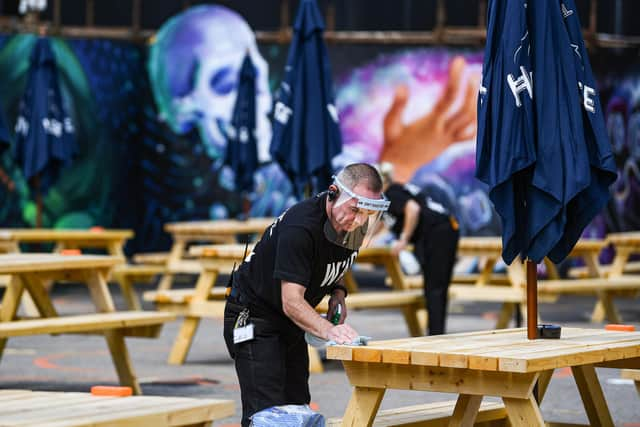Here are the top 10 things smaller firms are doing to make workplaces Covid-secure
The study is from Hitachi Capital Business Finance, which said the financial cost of the pandemic for small businesses “continues to linger” despite a “glimmer of light at the end of the Covid tunnel”, with the rollout of the vaccination programme and signs of an economic bounceback.
It also noted that costs can vary greatly across different sectors, with some expecting to spend nothing at all, and others set to shell out £5,446.
Advertisement
Hide AdAdvertisement
Hide AdAround 1,500 small business owners were surveyed in May, revealing those classified as location-based expected to pay the equivalent of just under £23bn altogether, given there are 5.82 million small businesses in the UK, according to House of Commons data.


Fixed-premises companies (41 per cent of small businesses) and those outdoor or on-site (17 per cent) estimated having to spend £5,443 and £5,446 respectively to ensure they were Covid-secure. In the hospitality and leisure sector, where 63 per cent of businesses will work full time from the same workplace, the average spend was £5,420.
Meanwhile, businesses planning to work in a hybrid set-up post restrictions – a fifth of small firms) – anticipated spending £3,660.
IT small businesses, where 37 per cent of organisations will solely work from home by the end of this year, expected to spend just £3,420 on average.
The report also found that for those expecting to work remotely post restrictions (around 21 per cent of all small businesses), two thirds expected to pay nothing at all, with just over a fifth spending less than £1,000.
The top ten measures being taken to ensure a workplace is Covid-secure for staff are as follows:
Professional cleaning (52 per cent) Facemasks/visors and sanitising products (51 per cent) Social distancing policy (48 per cent) Signs and posters for staff (36 per cent) Workstations reconfigured to avoid people sitting face to face (31 per cent) Conduct thorough risk-assessment (30 per cent) Temperature checks on arrival (30 per cent) Open window policy (29 per cent) Staggered shifts/working hours to avoid overcrowding (24 per cent) Staff advice on safe travel to and from work (car sharing and public transport) (23 per cent)
Joanna Morris, head of insight at Hitachi Capital Business Finance, said: “While the true cost of the pandemic for small businesses will not be known for some time, initial views suggest the hidden costs will add up.
Advertisement
Hide AdAdvertisement
Hide Ad"This is a good example of how the challenges associated with the global pandemic can vary hugely from one small business to another.
"While many non-remote businesses have faced, and continue to face, additional costs to remain compliant, our research has also shown these groups have benefited in other ways – from the quality of the work produced to stronger team spirit.
“For others where working remotely has been possible largely thanks to technology, we have reached the point where two in five small businesses are now considering working completely remotely or in a hybrid set-up.
"The task for bosses is to ensure their business manages the factors within their control, maintaining and improving their technological agility and minimising the chances of being left behind.”
A message from the Editor:
Thank you for reading this article. We're more reliant on your support than ever as the shift in consumer habits brought about by coronavirus impacts our advertisers.
If you haven't already, please consider supporting our trusted, fact-checked journalism by taking out a digital subscription.
Comments
Want to join the conversation? Please or to comment on this article.
